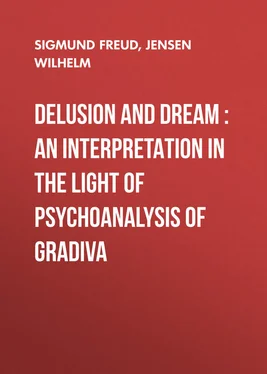Wilhelm Jensen - Delusion and Dream - an Interpretation in the Light of Psychoanalysis of Gradiva
Здесь есть возможность читать онлайн «Wilhelm Jensen - Delusion and Dream - an Interpretation in the Light of Psychoanalysis of Gradiva» — ознакомительный отрывок электронной книги совершенно бесплатно, а после прочтения отрывка купить полную версию. В некоторых случаях можно слушать аудио, скачать через торрент в формате fb2 и присутствует краткое содержание. Жанр: foreign_antique, foreign_prose, на английском языке. Описание произведения, (предисловие) а так же отзывы посетителей доступны на портале библиотеки ЛибКат.
- Название:Delusion and Dream : an Interpretation in the Light of Psychoanalysis of Gradiva
- Автор:
- Жанр:
- Год:неизвестен
- ISBN:нет данных
- Рейтинг книги:4 / 5. Голосов: 1
-
Избранное:Добавить в избранное
- Отзывы:
-
Ваша оценка:
- 80
- 1
- 2
- 3
- 4
- 5
Delusion and Dream : an Interpretation in the Light of Psychoanalysis of Gradiva: краткое содержание, описание и аннотация
Предлагаем к чтению аннотацию, описание, краткое содержание или предисловие (зависит от того, что написал сам автор книги «Delusion and Dream : an Interpretation in the Light of Psychoanalysis of Gradiva»). Если вы не нашли необходимую информацию о книге — напишите в комментариях, мы постараемся отыскать её.
Delusion and Dream : an Interpretation in the Light of Psychoanalysis of Gradiva — читать онлайн ознакомительный отрывок
Ниже представлен текст книги, разбитый по страницам. Система сохранения места последней прочитанной страницы, позволяет с удобством читать онлайн бесплатно книгу «Delusion and Dream : an Interpretation in the Light of Psychoanalysis of Gradiva», без необходимости каждый раз заново искать на чём Вы остановились. Поставьте закладку, и сможете в любой момент перейти на страницу, на которой закончили чтение.
Интервал:
Закладка:
As soon as he caught sight of her, Norbert’s memory was clearly awakened to the fact that he had seen her here once already in a dream, walking thus, the night that she had lain down as if to sleep over there in the Forum on the steps of the Temple of Apollo. With this memory he became conscious, for the first time, of something else; he had, without himself knowing the motive in his heart, come to Italy on that account and had, without stop, continued from Rome and Naples to Pompeii to see if he could here find trace of her – and that in a literal sense – for, with her unusual gait, she must have left behind in the ashes a foot-print different from all the others.
Again it was a noonday dream-picture that passed there before him and yet also a reality. For that was apparent from an effect which it produced. On the last stepping-stone on the farther side, there lay stretched out motionless, in the burning sunlight, a big lizard, whose body, as if woven of gold and malachite, glistened brightly to Norbert’s eyes. Before the approaching foot, however, it darted down suddenly and wriggled away over the white, gleaming lava pavement.
Gradiva crossed the stepping-stones with her calm buoyancy, and now, turning her back, walked along on the opposite sidewalk; her destination seemed to be the house of Adonis. Before it she stopped a moment, too, but passed then, as if after further deliberation, down farther through the Strada di Mercurio. On the left, of the more elegant buildings, there now stood only the Casa di Apollo, named after the numerous representations of Apollo excavated there, and, to the man who was gazing after her, it seemed again that she had also surely chosen the portico of the Temple of Apollo for her death sleep. Probably she was closely associated with the cult of the sun-god and was going there. Soon, however, she stopped again; stepping-stones crossed the street here, too, and she walked back again to the right side. Thus she turned the other side of her face toward him and looked a little different, for her left hand, which held up her gown, was not visible and instead of her curved arm, the right one hung down straight. At a greater distance now, however, the golden waves of sunlight floated around her with a thicker web of veiling, and did not allow him to distinguish where she had stopped, for she disappeared suddenly before the house of Meleager. Norbert Hanold still stood without having moved a limb. With his eyes, and this time with his corporeal ones, he had surveyed, step by step, her vanishing form. Now, at length, he drew a deep breath, for his breast too had remained almost motionless.
Simultaneously the sixth sense, suppressing the others completely, held him absolutely in its sway. Had what had just stood before him been a product of his imagination or a reality?
He did not know that, nor whether he was awake or dreaming, and tried in vain to collect his thoughts. Then, however, a strange shudder passed down his spine. He saw and heard nothing, yet he felt from the secret inner vibrations that Pompeii had begun to live about him in the noonday hour of spirits, and so Gradiva lived again, too, and had gone into the house which she had occupied before the fateful August day of the year 79.
From his former visit, he was acquainted with the Casa di Meleagro, had not yet gone there this time, however, but had merely stopped briefly in the Museo Nazionale of Naples before the wall paintings of Meleager and his Arcadian huntress companion, Atalanta, which had been found in the Strada di Mercurio in that house, and after which the latter had been named. Yet as he now again acquired the ability to move and walked toward it, he began to doubt whether it really bore its name after the slayer of the Caledonian boar. He suddenly recalled a Greek poet, Meleager, who, to be sure, had probably lived about a century before the destruction of Pompeii. A descendant of his, however, might have come here and built the house for himself. That agreed with something else that had awakened in his memory, for he remembered his supposition, or rather a definite conviction, that Gradiva had been of Greek descent. To be sure there mingled with his idea the figure of Atalanta as Ovid had pictured it in his Metamorphoses :
– her floating vest
A polished buckle clasped – her careless locks
In simple knot were gathered —
Trans. by Henry King.He could not recall the verses word for word, but their content was present in his mind; and from his store of knowledge was added the fact that Cleopatra was the name of the young wife of Œneus’ son, Meleager. More probably this had nothing to do with him, but with the Greek poet, Meleager. Thus, under the glowing sun of the Campagna, there was a mythological-literary-historical-archæological juggling in his head.
When he had passed the house of Castor and Pollux and that of the Centaur, he stood before the Casa di Meleagro from whose threshold there looked up at him, still discernible, the inlaid greeting “Ave.” On the wall of the vestibule, Mercury was handing Fortuna a pouch filled with money; that probably indicated, allegorically, the riches and other fortunate circumstances of the former dweller. Behind this opened up the inner court, the centre of which was occupied by a marble table supported by three griffins.
Empty and silent, the room lay there, appearing absolutely unfamiliar to the man, as he entered, awaking no memory that he had already been here, yet he then recalled it, for the interior of the house offered a deviation from that of the other excavated buildings of the city. The peristyle adjoined the inner court on the other side of the balcony toward the rear – not in the usual way, but at the left side and on that account was of greater extent and more splendid appearance than any other in Pompeii. It was framed by a colonnade supported by two dozen pillars painted red on the lower, and white on the upper half. These lent solemnity to the great, silent space; here in the centre was a spring with a beautifully wrought enclosure, which served as a fish-pool. Apparently the house must have been the dwelling of an estimable man of culture and artistic sense.
Norbert’s gaze passed around, and he listened. Yet nowhere about did anything stir, nor was the slightest sound audible. Amidst this cold stone there was no longer a breath; if Gradiva had gone into Meleager’s house, she had already dissolved again into nothing. At the rear of the peristyle was another room, an œcus , the former dining-room, likewise surrounded on three sides by pillars painted yellow, which shimmered from a distance in the light, as if they were encrusted with gold. Between them, however, shone a red far more dazzling than that from the walls, with which no brush of antiquity, but young Nature of the present had painted the ground. The former artistic pavement lay completely ruined, fallen to decay and weather worn; it was May which exercised here again its most ancient dominion and covered the whole œcus , as it did at the time in many houses of the buried city, with red, flowering, wild poppies, whose seeds the winds had carried thither, and these had sprouted in the ashes. It was a wave of densely crowded blossoms, or so it appeared, although, in reality, they stood there motionless, for Atabulus found no way down to them, but only hummed away softly above. Yet the sun cast such flaming, radiant vibrations down upon them that it gave an impression of red ripples in a pond undulating hither and thither. Norbert Hanold’s eyes had passed unheeding over a similar sight in other houses, but here he was strangely thrilled by it. The dream-flower grown at the edge of Lethe filled the space, and Hypnos lay stretched in their midst dispensing sleep, which dulls the senses, with the saps which night has gathered in the red chalices. It seemed to the man who had entered the dining-room through the portico of the peristyle as if he felt his temples touched by the invisible slumber wand of the old vanquisher of gods and men, but not with heavy stupor; only a dreamily sweet loveliness floated about his consciousness. At the same time, however, he still remained in control of his feet and stepped along by the wall of the former dining-room from which gazed old pictures: Paris, awarding the apple; a satyr, carrying in his hand an asp and tormenting a young Bacchante with it.
Читать дальшеИнтервал:
Закладка:
Похожие книги на «Delusion and Dream : an Interpretation in the Light of Psychoanalysis of Gradiva»
Представляем Вашему вниманию похожие книги на «Delusion and Dream : an Interpretation in the Light of Psychoanalysis of Gradiva» списком для выбора. Мы отобрали схожую по названию и смыслу литературу в надежде предоставить читателям больше вариантов отыскать новые, интересные, ещё непрочитанные произведения.
Обсуждение, отзывы о книге «Delusion and Dream : an Interpretation in the Light of Psychoanalysis of Gradiva» и просто собственные мнения читателей. Оставьте ваши комментарии, напишите, что Вы думаете о произведении, его смысле или главных героях. Укажите что конкретно понравилось, а что нет, и почему Вы так считаете.












